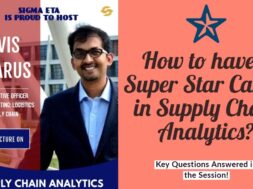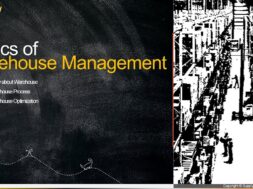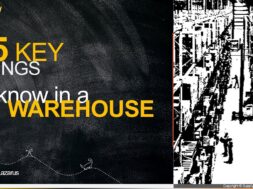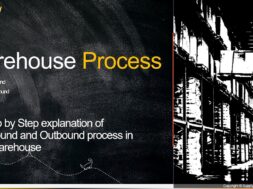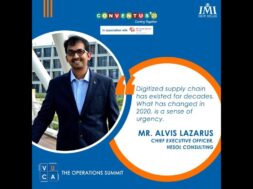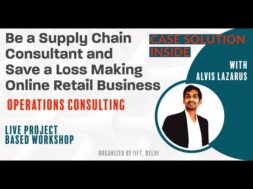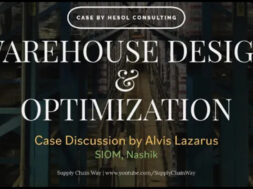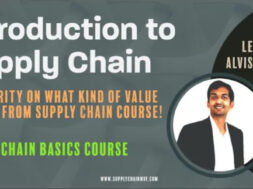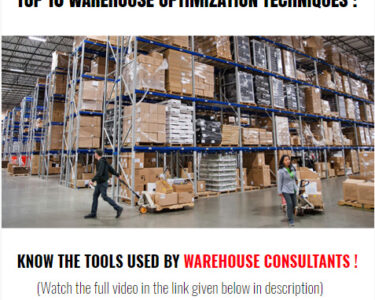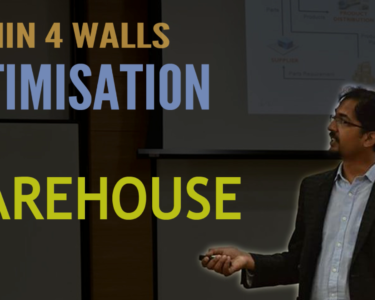How to have a Super Star Career in Supply Chain Analytics? Guest Lecture by Alvis Lazarus | IIM Tiruchy, SigmaEta
Pre-requisite Video:
Get a Free Copy of SCAM Model by Alvis Lazarus (download here) – https://supplychainway.com/supply-chain-analytics-career-scam-model-alvis-lazarus/
Supply Chain Coach’s Portfolio: https://www.linkedin.com/in/AlvisLazarusA/
————————————————————————–
If you would like to be notified on new videos, please subscribe to the channel: https://www.youtube.com/SupplyChainWay/
STAY CONNECTED
» Website: https://www.supplychainway.com
» Instagram: https://www.instagram.com/supplychainway/
» Facebook: https://www.facebook.com/supplychainway/
» LinkedIn: https://www.linkedin.com/company/supplychainway/
Questions asked in the session and answered by Alvis Lazarus
Question: How consulting and finance can be seen together? Do they go hand in hand? How will the finance role in a consulting company?
Answer: The first part of the question and second there is little bit of difference so let me start with the first part that is: How Consulting and finance can be seen together and do they go hand-in-hand?
They go really well together I assume that when you mention Consulting it is supply chain Consulting so obviously yes. Even to take a step back and if we think about the finance assets, end of the day business is about making a profit or walking towards making profit because you have to sustain in the market obviously the outcome is going to be service, customer experience etc. Anything you do at the end of the day you are going to analyze it financially and see whether it is financially viable and what is the kind of value proportion you get for the organization. This is the question you asked for any initiative in the organization. So consulting score objective that is supply chain consulting score objective is: Streamlining and optimizing supply chain in such a way that it gets a good value proportion to the organization and in case it could also bring that competitive edge to the organization. So having said these two obviously finance has an enormous role within a supply chain consulting so that is a big Yes. How will be the Finance role in a consulting company now first I talked about or what you asked about in terms of financial ability in terms of like how we talked about do you have strength in analytics. Similar to the awareness in finance as well as usage of finance in Consulting, a big yes. But finance role in consulting company how it is going to be depends upon what is the size of the company and what that role is going to be, I can’t directly tell you this going to be great because you are specifically asking how it is going to be within a consulting company but I can give you a few insights here: If the scale of operation of this consulting company is going to be really huge obviously all the expectation on a financial function would be there so definitely that is going to be work. But me being a Supply chain consultant if you ask me whether that is exciting I would say no because I belonged to supply chain consulting so that view would be via so you need to take my view accordingly.
The second thing probably I can put this way Financial role in a consulting company versus Financial role in a hardcore supply chain company where this could probably a product manufacturing and distribution. Then obviously my personal suggestion I would prefer a finance role in a non consulting company this is again my personal opinion. If you have any follow-up questions feel free to reach me on my Linden or you can reach me on the supply chain way channel.
Question: Someone from a non IT background, What courses should he do to pursue a career in the Analytical field? Which are more relevant courses?
Answer: If you want to get into data science or completely doing a full time role in analytics or you want to take your career on that way don’t think you have lost something. A person from IT background would have put years into a subject of information technology and you have not, that is fine it is not going to be a bottleneck, but you have to put more effort. If you want to do as a data scientist and full time into the analytics field then definitely you need to learn a language in which you can start programming, can build a lot of models, that use could be any within manufacturing or procurement or anywhere it is, but you need to learn a programming language. To give some of the tools which will really help you, I would strongly believe if you have the basics of Java, Sql that is going to be a great start. And second on above that languages like python these things are going to add benefits to you, but again I am going to restate you, keep in mind when you are going to do this kind of courses, what kind of value they are going to add for you. Again you can go back to the supply chain way channel. There is a general video on What evaluation you need to do yourself before you do a course, any certification you can refer to the video. If you get all tick marks in the video you are good to go this is one side of it.
But in case if you want to pursue something like that, what you can do is you can do courses which are a mix of analytics, that will give you the basics of analytics as well as good problem solving ability. This is where you can do courses like lean six sigma, theory of constraints or pure problem solving courses. You can do any of these courses if you want to get into a mix of analytics as well as functional then you need to follow this.
Question: How to integrate Strategy, Analytics and Operations together to make a career in consultancy?
Answer: Let me put in this way when we are using the word Strategy, please be very careful about it because that is a very big word. People use it very frequently. Hey I did strategy etc, it’s not like that. Strategy takes a lot and lots of depth of knowledge and good hands-on in business before you set a strategy, because this is kind of setting a rail, where the direction of an organization is all you need to do and then the execution follows it is very very important, that is how I see it.
Analytics and Operations: Analytics play a very crucial role in strategizing as well as on Operations. In Operations in the way of measuring how you do, in strategy in terms of simulation to tell whether this is the right way of taking my organization forward. So analytics is going to help in both these areas, Operations I see it’s purely execution as per the plan, it’s meticulously like a well oil machine consistently delivering so all three are completely different. Now if you want to integrate all these three into a consulting career you need to put in a lot and a lot of effort, I am going to give you a few more tips on that. But before that if you have to be a good consultant, if I am calling myself a supply chain consultant I work on all these areas, I need to set up a strategy for it that could be specific for a transformation or it could be the overall business as well.
1. I should be strong on strategizing.
2. Without an analytics backup I cannot even exist as a consultant so that is absolutely required.
3. Operations though you are not going to operate, you are going to run the machine being a consultant it is very very crucial you have operational experience. The reason is the moment you get into an organization you need to do some improvement you need to get together as a team. And you don’t have many many months to have that ice breaking with the middle management. So you should be a good operational person to quickly understand what is happening, jell well with the team such that you can work as a single team and then derive that initiative towards those transformations. So all these three are very very important to have a consulting career. So what you need to do is pretty simple:
1. Focus on Analytics and Operations :
If you prefer to invest 5 to 10 years on Operations and then become a consultant you very well invest your time on getting some analytics certifications or whatever you have been taught in your courses and you can start your career on operations and then move to the consulting and by 10 years and 15 years then you can start strategizing. At least 10 years because it’s going to take some time before you can start setting direction for an organization or if you say no I want to start directly as a consultant very well you can do that. You need to pick some really cream companies where you have roles like that, where you will get a lot of support, you can even find a few mentors inside the organization itself you will get shared out. Get to that kind of organization and then you can start the career but I am in operations, some time I feel if you do that obviously you are going to have a little problem, missing those hands-on experience. So I would still suggest you to not have at least 2 to 3 years of operations experience and probably avoid that edge in consulting again. It’s my personal opinion, it’s up to you both ways you can set your career.
Question: During your career, was there a time where you trusted intuition more than analytics? Can intuition and analytics go hand in hand?
Answer: I won’t say that every time I need to do analytics and take a decision, yes that could be an ideal stage and it should not become an overkill. There are many cases you have to leverage your experience and take decisions on the run. Don’t shy away from taking those decisions this is one of the needed trades in the business having said that don’t take it for granted. Telling now I know I have all the experience I am going to do as I wish, don’t do that. Wherever the decision is going to have a huge impact and you have the sufficient time you have to use analytics to get a data-driven decision, but on other ways you have to take decision on the run there is no other option you should use your intuition as well.
Question: I have done my bachelors in production and Industrial engineering, so what would be a suitable operations role for me?
Answer: Production and Industrial engineering one of the most understated role, in the sense Industrial engineering I treat that subject somewhere high, the reason being, if you remember the analytics road map I have given the Scam model, the link is given in the description below to this video. In the Scam model that you need a lot of data you collect a lot of data because that is the starting point of the data architectures and one slip there is going to mess up the entire project. Similar way for operations as well and an Industrial engineering plays a huge role on that, not just collecting of data Industrial engineering is such a vast subject. The role which should be suitable for you, you can get into operations roles typically Industrial engineers are very much wanted in sectors like Automotive you can target those sectors or even ecommerce another area which is also picking up lots of Industrial engineers. You can also directly get into production, you can work on directly the line, you can work on or it could be any kind of processing industries as well you will suit you can be there as well or you can absolutely become a complete planning an engineering team as well.
Question: How can I, as a fresher prepare for a role of supply chain consultant, given it is a challenging role for us? Also, if you could suggest some core industries which provide opportunities in Supply chain analyst roles, it would be of great help sir.
Answer: Preparation for supply chain consultant is a long run. This is my recommendation for 5 years in operations within that 5 years preferably at least two different sectors. Because you can decide that I want to be a supply chain consultant only for FMB or only for FMCG or only for online retail you can very well do that. I find it cutting across sector as very much exciting so from that standpoint I am giving you in 5 years at least two different companies you get that operations, get that hands-on and then probably next step would be getting into a consulting role, by doing that the sixth year when you are getting into consulting you directly get into a client facing role in a consulting organization, this is one option. Or you can directly start as a supply chain consultant in a junior role where you will get shared out, you will take at least 5 to 6 years before you do a client facing, this is my opinion and this is my recommendation and core industries which provide for supply chain analyst role is completely different from your first question. I put that as rather than putting as supply chain analyst role you are talking about a supply chain role, so what you need to do is there are very limited role available as supply chain analyst when you are using as supply chain as a word, rather join as a procurement analyst or a manufacturing analyst or a distribution or a warehousing analyst, start somewhere what you like a function within a supply chain subsequently gather more. Because if you made it as a supply chain analyst I am not talking about designation as a role to take care of end to end is very limited is probably start somewhere you like and then take in more. Take my example: I started in manufacturing then I took a plan then I went to warehousing and transportation then I made my career as a complete supply chain, it didn’t happen on day one. So that way works better. You get depth of knowledge on each function and then you can leverage that and take it to the next level.
Question: Which specialization would you suggest for a student with a biotechnology background?
Answer: Since you are from a bio-technology background you need to first get into a sector where this biotechnology experience will help you otherwise that complete experience will go waste. Sectors like pharma are good suits for you. I am not a big expert in biotechnology but from my experience that sector will suit you. Within that sector where you want to be a basis that you need to do a specialization, whether you want to be a core or R&D side or a business side or on the supply chain side or even specific within supply chain what you want to do, depending on that you need to do a specialization.
Question: 1. How relatable would it be for a Computer engineer (software developer) to get into Supply chain analytics (esp for the roles Business Analyst and consultant)?
Answer: First you asked for whether you won’t get bored or frustrated getting into the twelve. Because people who really liked the software development obviously will get bored into an analyst or consultant role it’s my opinion. So ideally if you are passionate about Software developing but still if you want to contribute to the supply chain you have to go into supply chain tech companies and start building a lot of products and actually the market is booming now. For example Global logistic is picking up you need lots and lots of technology enabled products in logistics and supply chain there is a perfect fit for a developer to go there leverage your skills and do it.
Second IoT block chain industries these three areas there is a lot of scope for you. Even beyond that if you want to still get into analytics all whatever you have learned in your software it’s going to actually help you. Now you exactly do whatever I have said in my previous video and in this session, you need to learn those core tools and then you can get into a role of business analyst and consultant provided you need to acquire one more skill set which is the Functional knowledge, which you will get it through your internship as you get into sectors you will learn those functional knowledge as well.
Follow up Question: As a first-year student, I believe we will learn operations and supply chain during the 2 yrs course. After that, would he/she make an ideal candidate for the job considering he/she lacks experience in the operations domain?
Answer: Job market is like that, always when you talk about operation they look for operational experience very limited role where they are ready to directly give it to fresher having said that invest your time on solving lots and lots of live projects, case study, interact with industries leaders and build your portfolio definitely will get . I will give you a simple example: go to my supply chain website and a lot of projects we have solved live in the form of case studies. Try to solve them and when you solve it actually we even provide a completion certificate, you can add them to your profile, which then tells that hey I worked on live project data and I have those relevant experience to do that. But one thing which we cannot provide is that actual experience of core operations in team management etc that you need to learn once you get into an organization.
Question 2. Can you suggest any course or certifications that could help learn the concepts about the same?
Answer: For operations you need to do some soft skill related courses one is problem solving, team management, crisis management theses kind of skill definitely you need to acquire. First you learn it in the form of certification then you can get into the field and learn it. The second one you can also learn problem solving tools like lean six sigma which I have just mentioned and some general certifications like project management all these will help you at immediately or at some point of time. But team management is again key, courses can take you somewhere but you need to acquire that skill. In case you are looking for what team management is, the difference is that you need to do productive improvement on a manufacturing shop floor where there are unions available where you can’t sit like in a conference room or your cabinets tell you that hey do this doesn’t work there. There as a team you need to get everyone as a team, so that skill will come by experience.
Question: Effect of strikes and labour union on Supply Chain based companies?
Answer: Let me put it this way when I was 20 years old I got into the manufacturing shop floor. The average age of my team is almost more than 35 and there was a very strong labour union. It made me what I am today because of 4 years of experience. You learn how to talk with people now you are at least afraid there is an union I can’t talk at least that makes you a good manager. I am grateful to LG equipment Coimbatore for giving me that experience. Till now it is been almost 20 years my team still connected with me, what that means is you create a bond with the team and you have to works towards doing that in every role that people should remember you, you leave back a legacy and don’t dictate thing you need to take your idea formulated get it to the team get the consciousness and take them towards the journey this is what you need to do. So the effects of strike and labour or these unions, first of all I am talking about unions in your life it actually shapes your career which is the positive. Strike and everything obviously that is part of risk management that is at an organization level.
Question: Sir, I have 4 years of work experience in the IT sector, I want to switch to consulting. I am thinking of taking operation and analytics as major specialization, is it a good way to get into consulting later on down the career path. Can you please guide me? Also which subject and certification should I go for.
Sir my second question is, whether general management can be clubbed with operations.
Answer: Let me start with first one, yes you can get into consulting but keep in mind you need to take a real stretch to acquire the functional knowledge if you do that all your skill on the IT is actually going to help you, because someone talks about web application or IoT or someone talk about everywhere your IT skill are going to be as a positive. The only gap I see which you need to fix is your functional knowledge which is very very important, analytics always going to be a boon for you.
Same way there are two options, in your case since you are from an IT background I am not sure whether it will get into an operation and do that rather you can get into some kind of planning role look for planning roles or you can also look for a direct consulting role. These two will suit you much better, but definitely you can have a fantastic career in operations and analytics.
The answer for the second question is general manager is kind of multiple managers positions together one of the very understated roles again. So operation is part of it, so what I am trying to tell is can be clubbed, yes but I would suggest that may get dilute your operations experience that’s the reason I would still suggest general management give you multiple trades if you on to become good operations managers you need to acquire more specific trades related to operations both functionally as well as analytically. So you need to do that you can also refer to the prior question and talk about the certification etc on operations will fit here as well.
Question: What are the certificates or skills should I acquire being a fresher interested to go into consulting, data analytics or operations?
How to decide whether the above 3 mentioned domains are my field of interest? If I should be doing any specific course or gain experience through an internship, then what are they and how can I apply?
Answer: I have told you that but I am going to listed very important your problem solving ability, which is the key and depending on how you want to take your career on analytics the languages what you have to learn or the basics is the most per man standpoint, team management acquiring that skill as on, so these ensures you have everything. So functional knowledge, problem solving ability, team management last one is at least basic analytics ability these are some of the secret tools to get it into there.
Most people have the question that how will I know that is my interest, but they won’t express it. The best way is pick up life case study and solve that will give you hands-on this is how it’s going to be. Second, talk to some people who are in this field and ask them this question: hey what you do 8 hours a day, what is your nature of work so the best way to do that is reaching out to those people and getting an input from them that is going to be really vital for you. So these two will ensure whether these fields are of your interest. Courses or other things I already told you about the internship is a great idea also to get hands-on but you cannot do multiple internships, so I would still suggest to do first what I said and decide the internship based on your interest.
Question: What does the career trajectory for a fresher look like in Consulting? What role and function should they start with?
Answer: For a fresher in consulting it’s very simple now itself you need to acquire functional knowledge that is cabin said that two ways I can do it one is going to be directly jump into consulting learn everything on the way but you will be losing your operations experience but still gives your edge but still if that is the way you want to do, you can do that, learn it on the run you can definitely do that target only the top five consulting firm in the country only there you will get that kind of experience. The second option is to get into operations or a planning role and learn the knowledge you can directly get into a mid level role in the consulting firm after 5 years. These are the two options, this is how your trajectory is going to go.
Question: How does the combo of Analytics and Marketing would evolve in future?
Answer: Analytics we already talked about. Marketing is one area specifically digital marketing or offline marketing, though people have the services are huge one of the biggest concerns for clients is measuring the effectiveness of the initiative, lots of gap there. So this combo definitely has a lot of future because analytics is now focused into the core areas, the support function it is not completely used. I think there is a lot of scope here to take it forward in the future. But as a career do you get that opportunity to build something I am not sure, so you need to choose very carefully these two combinations.
Question: Which subjects we should focus on for a career in Operations and supply chain?
Answer: For operations and supply chain moments I see some of the things are really crucial like top priority one is operation management, operation research for managers, business statistics, management information system these are the key ones and then probably management accounting not much. So these things are absolutely aligned with your operations and supply chain career also some common things like for example I talk about team management, managing people and performance in an organization would may be a better supply chain operations person or supply chain consultant as well. So managing people and performance in an organization is a great addition as well.
I hope I have answered all your questions to your satisfaction. Still you have any follow up question you can reach me on my linkedin or reach me on the supplychainway channel. If in the supply chain way channel if you have any question all you need to do is just put your comment down in the video itself and there will be a response within 24 to 48 hrs. Thank you so much.
